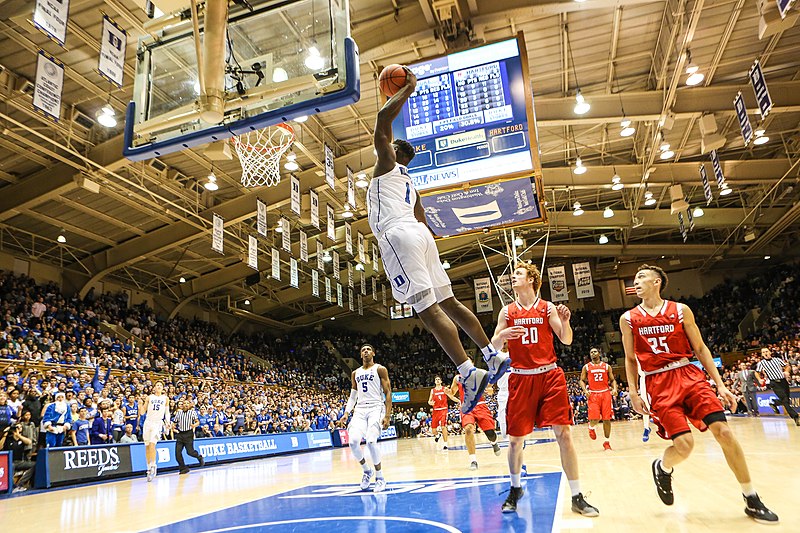
By: Sofya Bakradze
Some professional basketball players require a new pair of shoes every few games, if not every time they step out on the court. Just like regular consumers, they expect their shoes to degrade over time – but no one expected the likely No.1 NBA draft pick Zion Williamson’s Nike shoe to burst open within the first thirty-six seconds of Duke’s game against rival North Carolina on February 21, 2019.[1] Nike’s reputation and stock took a heavy hit the following day, with the latter dropping 1.7%, equivalent to roughly $1.1 billion of the brand’s value.[2]
Nike has had an exclusive deal with the Duke’s Blue Devils since 1992, and the parties are currently four years into a twelve-year deal for supply of uniforms, shoes, and apparel.[3] This means that Duke and Nike dictate exactly what Duke’s players wear during games.[4] Ultimately, it looks like Nike’s shoe of choice for the Blue Devils this season, the Nike PG-2.5, could not contain the force of Williamson’s 285-pound frame.[5] As of March 6, 2019, Williamson still has not returned to the court, missing his fourth game in two weeks as a result of the knee injury.[6]
The experts called the incident a “very visible shoe structure failure for a company committed to performance and technology of its products.”[7] According to UCC § 2-314, adopted by North Carolina, Nike has a duty to deliver a product that is of merchantable quality and fit for a particular purpose.[8] Arguably, both Duke and Nike knew that Williamson, blessed with an above average frame and agility, would require durable apparel, adding foundation to a claim of breach of implied duty of fitness for a particular purpose. A sneaker that fell apart in under a minute is clearly not merchantable nor fit for the purpose of a competitive basketball game. While Nike claims that this an isolated incident,[9] the statement does by itself relieve the company of the implied warranties that would attach to this transaction. However, even a valid breach of warranty claim by Williamson could be ineffective against an ironclad contract between Duke and Nike, which the players are not privy to. The contract states that Nike is not liable for injuries suffered by athletes wearing its products, illustrating the corporation’s foresight to avoid liability in similar situations.[10] The warranties indeed can be disclaimed as long as the party does so expressly and in writing,[11] and it is a common practice, making it difficult to accuse Nike of dodging the law.
Alternatively, Williamson could pursue a products liability claim and even have an easy win in a jurisdiction that applies strict liability standard, [12] meaning Nike could be automatically liable if its product caused an injury. North Carolina, however, applies the negligence standard, which would require the player to show that the product was manufactured or designed in an unreasonable manner, or that the manufacturer failed to adequately warn of dangers associated with the product or failed to give proper instructions for the product’s use. [13] Even if Williamson succeeded in his argument, Nike would likely assert the contributory negligence defense, claiming that it was the player’s responsibility to replace the worn-out pair of sneakers.
Despite public
condemnation and temporary loss of stock value, Nike will not experience any
long-lasting effects on its business.[14] The deals between
universities and sports apparel companies bring in millions of dollars to all
parties involved, except the players themselves. If Williamson suffered the
same knee injury as a professional athlete during an NBA game, he would have
the security of an employment contract, guaranteeing him millions of dollars.[15] As an NCAA amateur, he is
constrained by the interests of the university that may not align with his.
[1] Ryan McGee, Duke Loses Zion Williamson to Mild Knee Sprain When Shoe Blows Out, ESPN (Feb. 21, 2019), https://www.espn.com/mens-college-basketball/story/_/id/26042130/duke-loses-zion-williamson-mild-knee-sprain-shoe-blows-out.
[2] Kate Gibson, Nike’s High-Profile Shoe Fail Costs $1.1 Billion in Stock Value, CBS News (Feb. 21, 2019, 4:23 PM), https://www.cbsnews.com/news/nike-stock-drop-zion-williamson-shoe-incident-and-injury-costs-1-1-billion-in-stock-value/.
[3] See McGee, supra note 1.
[4] Marc Tracy and Kevin Draper, A Star’s Shoe Breaks, Putting College Basketball Under a Microscope, N.Y. Times (Feb. 21, 2019), https://www.nytimes.com/2019/02/21/sports/zion-nike-shoe-ncaa.html.
[5] Id.
[6] Zion Williamson, https://www.espn.com/mens-college-basketball/player/_/id/4395628/zion-williamson (last visited March 6, 2019).
[7] See Gibson, supra note 2.
[8] U.C.C. §§ 2-314, 315 (Am. Law Inst. & Unif. Law Comm’n 1977).
[9] But see Tracy & Draper, supra note 4 (remembering one of the most infamous shoe-related incidents involving Eliud Kipchoge who won the Berlin Marathon despite the soles of his Nike shoes slipping out of place).
[10] See Tracy & Draper, supra note 4.
[11] U.C.C. § 2-316 (Am. Law Inst. & Unif. Law Comm’n 1977).
[12] Reynold M. Sachs, Negligence Or Strict Product Liability: Is There Really A Difference In Law Or Economics?, 8 Ga. J. Int’l & Comp. L. 259, 260 (1978) (highlighting the fact that strict liability framework eliminates a lot of barriers for plaintiffs).
[13] N.C. Gen. Stat. §§ 99B-1.1–1.6. See also Sachs, supra note 10, at 261 (condemning the proof of negligence requirement in product liability cases as an impossibly high standard).
[14] Marlene Towns, ‘Epic Fail’ Won’t Change Nike, But it Could Change College Sports, The Hill (Feb. 24, 2019, 10:30 AM), https://thehill.com/opinion/finance/431268-epic-fail-wont-change-nike-but-it-could-change-college-sports.
[15] Michael McCann, Could Zion Williamson’s Sneaker-Related Knee Injury Lead to Legal Action Against Nike?, Sports Illustrated (Feb. 21, 2019), https://www.si.com/college-basketball/2019/02/21/zion-williamson-knee-injury-duke-unc-north-carolina-nike-sneakers-legal-impact.

